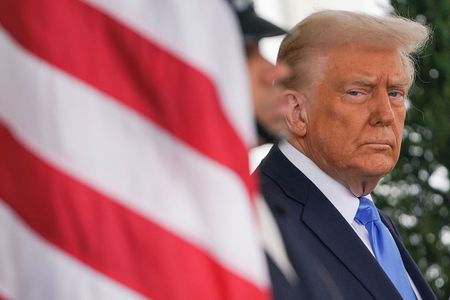By Ahmed Aboulenein
WASHINGTON (Reuters) – Robert F. Kennedy Jr., a vaccine critic who endorsed President Donald Trump after abandoning his own presidential bid, inched closer to becoming U.S. secretary of Health and Human Services with the Senate scheduled to vote on his confirmation on Thursday.
The Republican majority seemed poised to confirm Kennedy, who made pledges to protect existing vaccination programs in a bid to secure votes of hesitant lawmakers.
If confirmed, Kennedy will have overcome resistance from the medical establishment and members of Congress and would be sworn into a job overseeing multiple high-profile agencies, including the FDA and Centers for Disease Control and Prevention.
Kennedy, 71, is an environmental lawyer who has long sown doubts about the safety and efficacy of vaccines that have helped curb disease and prevented millions of deaths for decades.
He will be charged with running an HHS department that directs more than $3 trillion in healthcare spending. Also under HHS purview are the Medicare and Medicaid programs that provide health insurance for over 140 million Americans and the National Institutes of Health.
Kennedy says he wants to work to end chronic disease, break any ties between employees at the U.S. drug regulator and industry and advise U.S. water systems to remove fluoride. Opponents say he is unfit for the job because of his prominent role in the anti-vaccine movement.
Kennedy’s path to confirmation has been fraught, and he did not always appear to have the necessary votes among Republicans. He had to overcome his past as a lifelong Democrat, his previous views in support of abortion, as well as his stance on vaccines. Some prominent members of his own family, including cousin Caroline Kennedy, also urged his rejection.
Ultimately, Senate Republicans appear set to close ranks as they have for every Trump cabinet selection so far, including his pick for defense secretary, Pete Hegseth, who needed a tie-breaking vote from Vice President JD Vance to be confirmed.
The White House has offered buyouts to 2 million civilian full-time federal workers as part of plans to drastically shrink the size of the government. Kennedy has said he wants to get rid of many employees at both the FDA and NIH.
KENNEDY COMMITMENTS
Democrats accused Kennedy over two days of contentious confirmation hearings of being financially vested in the anti-vaccine movement and peddling conspiracy theories to sow doubt about lifesaving medicines, assertions he rejected.
Republican Bill Cassidy, a doctor with decades of work in community-based health, was seen as a potential swing vote against Kennedy after expressing wariness about the nominee’s vaccine views.
Cassidy ultimately cleared the path for a vote by the full Senate with his committee vote in favor of Kennedy despite publicly stated reservations that had put the outcome in doubt.
After facing an intense political pressure campaign – including billionaire Elon Musk’s threats to support primary opponents of any Republican who obstructed Trump’s nominees – Cassidy said he had gotten the necessary reassurances to vote in line with his party.
Cassidy said he received commitments from Kennedy that he would not remove government health agency statements that vaccines do not cause autism. Kennedy has long espoused a debunked link between vaccines and autism despite scientific evidence to the contrary.
Kennedy also committed to work within the existing vaccine approval and safety monitoring systems and to honor decisions by the CDC’s outside panel of experts, known as the Advisory Committee on Immunization Practices, without changes.
Kennedy has also called for banning hundreds of food additives and chemicals and for getting ultra-processed foods out of school lunches.
His political future seemed uncertain last summer as his independent presidential campaign faltered. In August, he ended the campaign and endorsed Trump in exchange for a role in Trump’s administration.
The deal, helped along by Trump donor and financier Omeed Malik, brought Trump extra support in the presidential election.
After the endorsement, Kennedy supporters flocked to back the Republican, trusting that Kennedy, who coined the phrase “Make America Healthy Again,” would be given a second political chance if Trump returned to the White House.
(Reporting by Ahmed Aboulenein; Additional reporting by Stephanie Kelly; Editing by Caroline Humer and Bill Berkrot)











